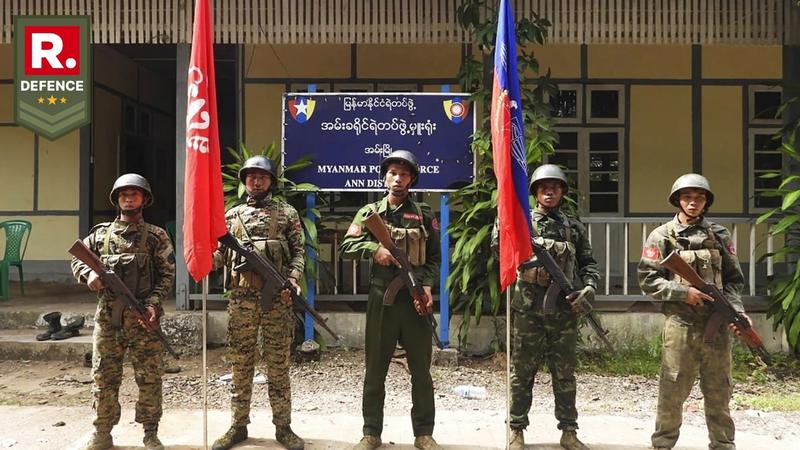Published 09:00 IST, December 26th 2024
Arakan Army’s Advance Spurs Bangladesh to Act on Rohingya Repatriation
While Dhaka maintains a cautious stance, the potential alignment highlights the Rohingya crisis's regional implications.

Rakhine State, Myanmar – The escalating conflict in Myanmar's Rakhine State has taken a new turn as the rebel Arakan Army (AA) established contact with the Bangladesh Army following its successful capture of key areas, including Maungdaw and the Western Military District Headquarters in Ann. The AA, a constituent of the Three Brotherhood Alliance, seeks Bangladesh's support in securing vital supply lines and facilitating humanitarian efforts amid the ongoing crisis.
The Arakan Army’s offensive in Rakhine State has resulted in significant territorial gains, with 14 towns falling under its control. These include strategically crucial locations such as Maungdaw, Buthidaung, and Ann. During the siege of Ann, the AA captured Brigadier General Thaung Htun and Brigadier General Kyaw Kyaw Than, key Myanmar military leaders, marking a symbolic victory against the junta forces.
Bangladesh’s Role in the Crisis
The Bangladesh Army’s Ramu-based 10th Infantry Division has engaged in field-level communications with the AA to address mutual concerns. Among the primary topics of discussion is the establishment of a ‘safe zone’ for Rohingya refugees. These negotiations align with a broader diplomatic initiative led by Bangladesh’s Foreign Ministry Adviser Tauhid Hossain during a recent multilateral meeting in Bangkok. Representatives from Thailand, Myanmar, China, Laos, and Cambodia participated in these talks, with Bangladesh advocating for the safe and time-bound repatriation of over two million displaced Rohingya.

Bangladesh has proposed creating a ‘safe zone’ to ensure the safety of Rohingya refugees fleeing violence or displaced within Rakhine State. This zone would serve as a buffer to prevent further displacement and allow humanitarian agencies to provide essential services. Sources indicate that Dhaka is exploring the possibility of recognizing the Arakan Army’s authority in exchange for assurances of the safe zone.
The capture of Maungdaw by the Arakan Army has given the rebel group full control over the 271-kilometer Bangladesh-Myanmar border along the Naf River. This development has heightened the need for secure border management, with Bangladeshi authorities keen to leverage the situation for the safe repatriation of Rohingya refugees.
Arakan Army’s Strategic Objectives
While the AA has made remarkable advances, including securing 14 towns, several key areas in Rakhine remain under junta control. These include Sittwe, Kyaukphyu, and Manaung, which are fortified by Myanmar’s military and air force. The ongoing operations in Gwe township underscore the AA’s determination to consolidate its territorial control and secure its supply lines.

A press note issued by the AA highlights the group’s objectives, emphasizing the need to maintain operational momentum while addressing humanitarian challenges in areas under their control. The AA has also expressed a willingness to engage in dialogue to ensure stability in the region.
Bangladesh’s Calculated Response
Bangladesh’s security apparatus has maintained a cautious but strategic stance in its interactions with the Arakan Army. Following the fall of Maungdaw, AA troops briefly crossed into Bangladeshi territory, reportedly to establish communication channels. Dhaka sees these interactions as an opportunity to address the long-standing Rohingya crisis while ensuring regional security.

Sources within Bangladesh’s defence establishment have hinted at a possible tacit recognition of the AA’s authority in exchange for their cooperation on the Rohingya issue. However, such a move would require careful diplomatic balancing, given the regional and international implications.
Regional Implications and Future Outlook
The developments in Rakhine State underscore the fragility of Myanmar’s internal security and the complexities of regional diplomacy. The AA’s territorial gains, coupled with Bangladesh’s proactive engagement, signal a shift in the dynamics of the conflict. As the AA consolidates its control and Bangladesh navigates its strategic interests, the coming weeks will be critical in determining the future of the Rakhine crisis and the fate of millions of Rohingya refugees.
The situation remains fluid, with ongoing military offensives, humanitarian negotiations, and diplomatic overtures shaping the trajectory of this complex conflict.
Updated 09:00 IST, December 26th 2024




